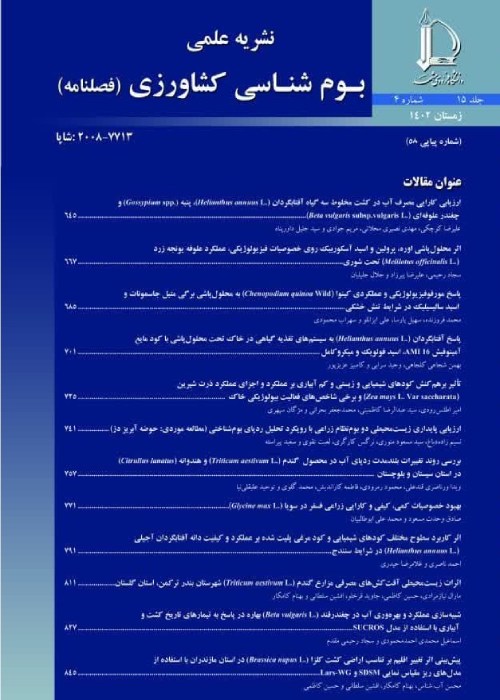Application of Eco-Friendly Inputs on Cultivation of Iranian Ox-Tongue (Echium amoenum Fisch. & Mey.) in Conditions of Mashhad
Author(s):
Article Type:
Research/Original Article (دارای رتبه معتبر)
Abstract:
Introduction
In recent years, the effect of ecological inputs on soil properties and plant growth characteristics has received renewed attention. Although the utilization of mineral fertilizers could be viewed as the best solution in terms of plant productivity, this approach is often inefficient in the long-term in tropical ecosystems due to the limited ability of low-activity clay soils to retain nutrients. Biofertilizer is a substance which contains living microorganisms which, as applied to seed, plant surfaces, or soil, colonizes the rhizosphere or the interior of the plant and promotes growth by increasing the supply or availability of primary nutrients to the host plant. Biofertilizers add nutrients through the natural processes of nitrogen fixation, solubilizing phosphorous and stimulating plant growth through the synthesis of growth-promoting substances. Biofertilizers can be expected to reduce the use of chemical fertilizers and pesticides. Humic substances are a group of heterogeneous molecules that are bonded together by weak forces; therefore, they have a high chemical stability. This material included of 65 to 80 percent of total soil organic matter. Humic acid influences soil fertility through its effect on the water-holding capacity of the soil. Humic acids make important contributions to soil stability and soil fertility leading to exceptional plant growth and micronutrient uptake. Mycorrhiza arbuscular fungi are other coexist microorganisms that improves soil fertility, nutrients cycling and agroecosystem health. Mycorrhizal fungi are the most abundant organisms in agricultural soils. Many researchers have pointed to the positive roles of mycorrhizal fungi on plants growth characteristics. Echium amoenum is a wild perennial herb and known in Iran as Ox-Tongue. It is one of the important medicinal plants in Iranian traditional medicine. Petals of Iranian Ox-Tongue have been advocated for a variety of effects such as demulcent, anti-inflammatory and analgesic, especially for common cold, anxiolytic, sedative and other psychiatric symptoms including obsession in folk medicine of Iran. Despite of many researches on the effect of organic acids and biofertilizers on different crops, information on the effects of these factors for many medicinal plants is scarce, therefore, in this study effect of eco-friendly inputs in cultivation of Echium amoenum in conditions of Mashhad was studied.
Materials and Methods
In order to evaluate organic acids, plant growth rhizobacteria and different species of mycorrhiza on yield and yield components of Iranian Ox-Tongue (Echium amoenum), a split plots experiment in time based on RCBD design with three replications was conducted in 2011-2014 growing seasons, in Ferdowsi University of Mashhad, Iran. Seven different types of soil amendments and biofertilizers concluded humic acid, fulvic acid, Nitroxin® (containing Azotobacter spp. And Azospirillum spp.), Biophosphorous® (containing Bacillus sp. and Pseudomonas sp.), Biosulfur® (containing Thiobacillus spp.), Mycorrhiza (Glomus mosseae), Mycorrhiza (Glomus intraradices), and no fertilizer as control and agronomic years (2 and 3 agronomic years) assigned to main and sub plots, respectively.
Result and Discussion
The results showed that the highest dry flower yield obtained in humic acid treatment. Humic acid and fulvic acid increased seed weight per plant 38 and 25% and seed number per plant 19 and 17% compared to control, respectively. Fulvic acid, nitroxin, biophosphorous, biosulfur, mycorrhiza (Glomus mosseae) and mycorrhiza (Glomus intraradices) increased dry flower yield 27, 20, 4, 26, 30 and 28% compared to control, respectively. The highest flower and seed harvest index obtained in mycorrhiza (Glomus intraradices) and humic acid treatments, respectively. It seems that different species of mycorrhiza improved morphological characteristics and yield of Echium amoenum due to provide better conditions to absorption and transportation of nutrient to the plant. It has been reported that organic acids provided favorable conditions for plant growth and development through improvement of physical, chemical and biological properties of the soil, therefore, it can be concluded that improvement of most of studied traits in the present study were due to use of organic acids.
Conclusion
In general, the findings of this research showed that application of ecological inputs, while increasing yield and yield components of Iranian Ox-Tongue, can reduce dependence on chemical inputs and their environmental risks and can be used to develop sustainable agriculture and protect the health of the environment.Keywords:
Language:
Persian
Published:
Agroecology journal, Volume:10 Issue: 3, 2018
Pages:
679 to 698
magiran.com/p1930779
دانلود و مطالعه متن این مقاله با یکی از روشهای زیر امکان پذیر است:
اشتراک شخصی
با عضویت و پرداخت آنلاین حق اشتراک یکساله به مبلغ 1,390,000ريال میتوانید 70 عنوان مطلب دانلود کنید!
اشتراک سازمانی
به کتابخانه دانشگاه یا محل کار خود پیشنهاد کنید تا اشتراک سازمانی این پایگاه را برای دسترسی نامحدود همه کاربران به متن مطالب تهیه نمایند!
توجه!
- حق عضویت دریافتی صرف حمایت از نشریات عضو و نگهداری، تکمیل و توسعه مگیران میشود.
- پرداخت حق اشتراک و دانلود مقالات اجازه بازنشر آن در سایر رسانههای چاپی و دیجیتال را به کاربر نمیدهد.
In order to view content subscription is required
Personal subscription
Subscribe magiran.com for 70 € euros via PayPal and download 70 articles during a year.
Organization subscription
Please contact us to subscribe your university or library for unlimited access!



